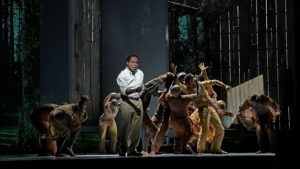Being back at the Metropolitan Opera in New York last Wednesday had a surreal quality. Masked faces peered across balconies through opera glasses. The sound of the orchestra warming up blended with audience chatter. And beneath the cacophony, the boom-ta-ta of a drum set.
Yes, a drum set. The Met has made its historic return after 18 months of pandemic shutdown with Terence Blanchard’s Fire Shut Up in My Bones. It’s the Met’s first opera by a Black composer — a fact stated in both celebration and embarrassment. (It will be simulcast, live in HD, on Saturday, Oct. 23.)
Blanchard, a jazz trumpeter, has composed more than 60 film scores, collaborating frequently with director Spike Lee. Fire calls for a jazz quartet in addition to the orchestra, which adds a rhythmic grounding and popular flair. I was pleased to see that the Met audience seemed younger and more diverse than usual.

The libretto by Kasi Lemmons is based on journalist Charles M. Blow’s memoir by the same name. It begins in medias res. Charles, sung by Will Liverman, is barreling down a Louisiana back road with a gun in the passenger seat of his car. He is on his way to kill his cousin, Chester, whose part was artfully sung by Benjamin Taylor, standing in for Chris Kenney on the night that I attended. The allegorical character Destiny, sung hauntingly by Angel Blue, draws him into a flashback of his childhood.
We learn that the seven-year-old Char’es-Baby’s family is dirt poor (literally — there’s a scene where Charles and his brothers describe eating dirt). His mother, Billie, works at a chicken processing factory; his father, Spinner, is a womanizer. Char’es-Baby, played by the adorable Walter Russell III, craves attention, which makes him especially vulnerable when Chester sexually molests him.
In this flashback, Char’es-Baby sings mostly in octaves with his adult counterpart. The effect could have been dramatic, but because of the natural tendency for boy sopranos to be pitchy ends up being a bit distracting.
Blanchard’s strength is his orchestration — blending jazz and classical idioms — rather than his vocal lines, which are sometimes, literally, almost one-note. But a scene in the chicken factory has genuinely catchy music, as well as the line “big ol’ ass and really tight pussy,” which, I assume, is a first on the Met’s stage. Despite months of being laid off, the orchestra was in good form, and Yannick Nézet-Séguin conducted with aplomb.
The second act opens with a ballet sequence — men in skin-colored outfits billow and bend like trees. During Liverman’s aria “Peculiar Grace,” the haunting melody is picked up by the cello. It later returns when Charles is going off to college at Grambling State University. In one scene where Charles tries to purge his inner demons through baptism, Blanchard makes good use of an energetic gospel choir.

The third act includes a hazing scene involving the fraternity Kappa Alpha Psi. The a capella step dance that the brothers perform is in some ways out of place in the opera, but extremely impressive. During the performance that I attended, the dance received the loudest applause of the night.
Charles has a relationship with Greta, also sung by Angel Blue, that ends after he tells her about his history of abuse and she admits she is seeing someone else. When Charles calls home to hear his mother’s voice, Chester is there, prompting the murderous plan that opens the opera. But ultimately, after listening to Destiny and his younger self, Charles is able to “just leave it all behind.”
Both the program notes and New York Times reviews gloss over the queer elements of the libretto, which are more explicit in the book. Blow is bisexual and writes about it candidly in Fire Shut Up in My Bones. In the first act of the opera, the community views Char’es-Baby as somehow different. He is called “a boy of peculiar grace.” Chester calls him a “punk,” which is a slur. The ballet sequences, which turn out to be Charles’s dreams, are homoerotic. He later sings of “strange desires, half formed” that appear to him during the night.
There may be some bisexual erasure going on here. Charles’s relationships in the opera are with women — first with Evelyn, sung by Brittany Renee, with whom he loses his virginity in the second act, and then with Greta. And the linking of homosexuality with perversion is problematic. Blow writes in his book, “Abusers don’t necessarily make children different in that way, but rather, they are diabolically gifted at detecting that kind of difference, often before the child can see it in him or herself, articulate it, and accept it. It is possible that Chester glimpsed a light in me, and that moved the darkness in him.”
One strength of Fire Shut Up in My Bones, the opera, is that the plot can take on different meanings. It’s about race, sexuality, trauma, and coming of age.
Met Again
The event: Fire Shut Up in My Bones live in HD
The time: Saturday, Oct. 23, 12:55 p.m.
The place: Wellfleet Harbor Actors Theater, 2357 Route 6
The cost: $15 to $30 at what.org
